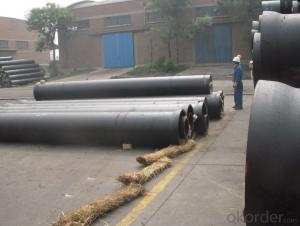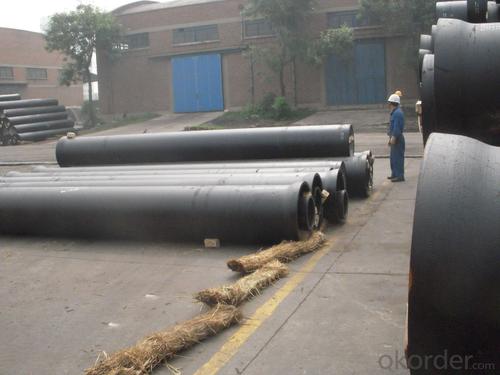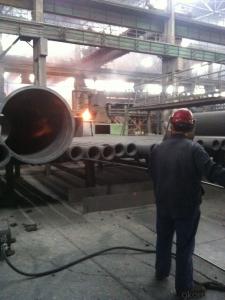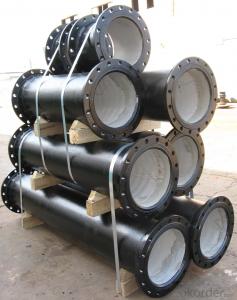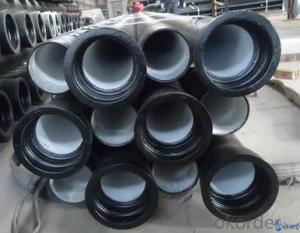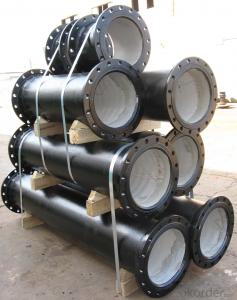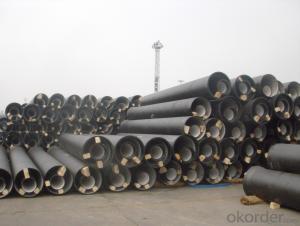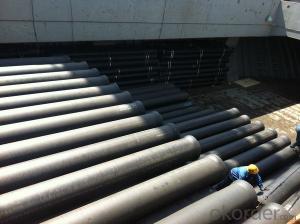DUCTILE IRON PIPES AND PIPE FITTINGS K8 CLASS DN800
- Loading Port:
- Tianjin
- Payment Terms:
- TT OR LC
- Min Order Qty:
- 22 pc
- Supply Capability:
- 3000 pc/month
OKorder Service Pledge
OKorder Financial Service
You Might Also Like
Material : Ductile Cast Iron
Size Range : DN 80mm to DN 2000mm
Unit Effective Length : 6m or 5.7m
Manufacture Standard: ISO 2531:1998/ EN 545:2006/EN 598:2007
Annual capacity : 200,000 tons
Coating Exterior: Zinc 130g/m2 according to ISO 8179-1 and bitumen coating 70 microns.
Cement Interior: Portland Cement/ High Alumina Cement/ Sulphate Resisting Cement Lining according to ISO 4179
Special requirements on external coating and internal lining can be applied
We also provide accessories such as SBR/EPDM rubber gaskets, lubricant paste, pipe caps, PE sleeves, etc.
Additional Parts:
Each pipe is strictly inspected according to related standard to ensure permanently high performance.
Easy Installation at site and service free for life
Long Service Lifespan
Quotation will arrive you within 24hours once we get your inquiry.
We guarantee offering you a competitive price.
A copy of original inspection reports of pipes will be offered after shipment.
Photos of loading process will be sent to the customer after shipment effect.
We will follow-up the delivery progress after shipment effect and update to the customer on weekly basis.
- Q: What is the typical pressure rating of ductile iron pipes?
- The pressure rating of ductile iron pipes varies depending on the application and size, typically designed to endure high pressure levels. In water and wastewater systems, for instance, ductile iron pipes generally have a pressure rating of 250 psi or higher. In industrial applications like oil and gas pipelines, larger pipes can have a pressure rating ranging from 350 psi to 500 psi or more. To determine the precise pressure rating for a specific ductile iron pipe, it is crucial to consult the manufacturer's specifications and industry standards.
- Q: Are ductile iron pipes suitable for road crossings?
- Indeed, road crossings can indeed be suitably accommodated by ductile iron pipes. Given its robustness and durability, ductile iron proves to be exceedingly appropriate for subterranean installations, specifically road crossings. These pipes exhibit remarkable tensile strength, enabling them to endure substantial loads and traffic pressures without succumbing to fractures or breakages. Moreover, ductile iron pipes showcase exceptional resistance to corrosion, guaranteeing their durability even in the harshest of environments. Not to mention, their effortless installation and upkeep render them a dependable option for road crossings.
- Q: Can ductile iron pipes be used in areas with high soil salinity?
- Yes, ductile iron pipes can be used in areas with high soil salinity. Ductile iron pipes have excellent corrosion resistance and are often used for underground applications, including in areas with high soil salinity. The pipes are specially coated to prevent corrosion and are known for their durability and long service life, making them suitable for such environments.
- Q: What is the expected service life of ductile iron pipe?
- The expected service life of ductile iron pipe can vary depending on various factors such as the quality of the pipe, the environment it is installed in, and the maintenance and care it receives. However, on average, ductile iron pipe has a life expectancy of 80 to 100 years.
- Q: Can ductile iron pipe be used for desalination plants?
- Certainly, desalination plants can utilize ductile iron pipe. Ductile iron, a robust and enduring material, has found extensive application across various industries, notably in water and wastewater treatment facilities. It boasts exceptional resistance against corrosion, remarkable tensile strength, and the ability to withstand external loads and pressures. Consequently, it proves ideal for conveying water and other fluids within desalination plants, where the presence of high salt concentration and other corrosive elements prevails. Furthermore, ductile iron pipes are renowned for their prolonged service life and minimal maintenance demands, rendering them advantageous to desalination plants that operate continuously and necessitate a dependable and efficient piping system.
- Q: What is the manufacturing process of ductile iron pipes? Thank you
- Ductile iron pipe is a pipe dream of urban water supply, gas pipelines, sets of high strength, good ductility and corrosion resistance strong strength, has the essence of iron, steel, cast iron pipe and steel pipe is a traditional popular replacement products, is a kind of widely used pressure water supply, gas and send pipes. Has the advantages of high strength, good toughness, corrosion resistance and easy device and other excellent characteristics, is the traditional grey iron and steel pipe replacement products popular, has become the preferred data of water supply, gas industry, set high strength, good ductility and corrosion resistance strong strength, has the essence of iron, steel, is the traditional cast iron pipe and steel pipe replacement products under the popular small as you introduce the ductile iron pipe is how to make the.
- Q: The difference between spheroidal graphite cast iron pipe and HDPE water supply pipe
- HDPE pipe is made of hot melt butt joint, and the strength of interface is very good. Ductile iron pipes are made of socket joint, and reinforced concrete piers shall be rammed on three links, elbows and other parts. In this regard, the cost of natural selection of ductile iron pipe, HDPE pipe than the choice of high.
- Q: Can ductile iron pipe be used for oil and gas transmission pipelines?
- Yes, ductile iron pipe can be used for oil and gas transmission pipelines. It offers excellent strength, durability, and corrosion resistance, making it suitable for the transportation of various fluids, including oil and gas. However, other factors such as specific project requirements, operating conditions, and regulatory standards should also be considered before making a final decision.
- Q: What is the expected sound transmission loss of ductile iron pipes?
- The expected sound transmission loss of ductile iron pipes can vary depending on various factors such as pipe thickness, diameter, and the surrounding environment. Generally, ductile iron pipes have good soundproofing properties due to their dense and heavy construction. They are typically designed to minimize noise transmission and vibration. In terms of sound transmission loss, ductile iron pipes can provide significant attenuation of noise. The material's inherent density and high mass make it effective in blocking sound waves and reducing their transmission. However, it is important to note that the sound transmission loss of ductile iron pipes may not be as high as other specialized soundproofing materials such as acoustic insulation or double-wall piping systems. To accurately determine the expected sound transmission loss of ductile iron pipes in a specific application, it is advisable to consult the manufacturer's specifications or conduct acoustic tests in accordance with relevant standards such as ASTM E90. These tests can provide precise data on the sound transmission loss values of ductile iron pipes under various conditions, helping to ensure proper noise control and acoustic performance in specific installations.
- Q: Can ductile iron pipes be used for underground fire protection systems?
- Ductile iron pipes are indeed applicable for underground fire protection systems. Their exceptional strength and durability render them suitable for enduring the intense pressure and high temperatures that may arise during a fire. Moreover, these pipes exhibit significant resistance to corrosion, a vital attribute for long-term underground usage. In addition, they possess exceptional flow characteristics, enabling swift and efficient water delivery for extinguishing fires. All in all, ductile iron pipes prove to be a dependable and efficient selection for underground fire protection systems.
Send your message to us
DUCTILE IRON PIPES AND PIPE FITTINGS K8 CLASS DN800
- Loading Port:
- Tianjin
- Payment Terms:
- TT OR LC
- Min Order Qty:
- 22 pc
- Supply Capability:
- 3000 pc/month
OKorder Service Pledge
OKorder Financial Service
Similar products
Hot products
Hot Searches
Related keywords
